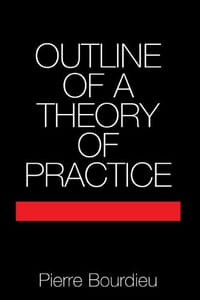Outline of a Theory of Practice is recognized as a major theoretical text on the foundations of anthropology and sociology. Pierre Bourdieu, a distinguished French anthropologist, develops a theory of practice which is simultaneously a critique of the methods and postures of social science and a general account of how human action should be understood. With his central concept of the habitus, the principle which negotiates between objective structures and practices, Bourdieu is able to transcend the dichotomies which have shaped theoretical thinking about the social world. The author draws on his fieldwork in Kabylia (Algeria) to illustrate his theoretical propositions. With detailed study of matrimonial strategies and the role of rite and myth, he analyses the dialectical process of the 'incorporation of structures' and the objectification of habitus, whereby social formations tend to reproduce themselves. A rigorous consistent materialist approach lays the foundations for a theory of symbolic capital and, through analysis of the different modes of domination, a theory of symbolic power.
皮埃尔•布尔迪厄(Pierre Bourdieu,1930年8月1日—2002年1月23日),是当代法国著名的社会学家,思想家和文化理论批评家,法兰西学院唯一的社会学教授,和英国的吉登斯(Anthony Giddens)、德国的哈贝马斯(Jurgen Harbermas)被认为是当代欧洲社会学界的三杰。布尔迪厄横跨众多领域,打破了学科界限,从跨学科的角度入手,对人类学、社会学、教育学、语言学、哲学、政治学、史学、美学、文学等都有研究,提出了一系列独到的思想范畴,建构了相当新颖的学术框架。作为法国当代最有声望的社会学家,思想家和文化理论批评家,布尔迪厄以其独创性的学术研究和丰裕的理论创作,在法国和整个西方人文社会科学界掀起一阵阵争论浪潮,推动着当代西方人文社会科学理论和方法论的重大变革,为人文社会科学的发展本身开辟了更加广阔的前景。
显示全部

